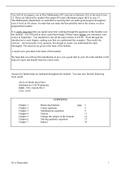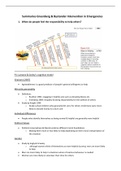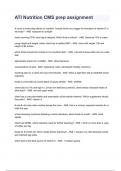*With replacement: The samples can be repeated in the table.
Statistics and Probability 1. 𝑛1 × 𝑛2 = 𝑠𝑎𝑚𝑝𝑙𝑒 𝑚𝑒𝑎𝑛
Sampling Technique - 5(students) x 5(students scores) = 25
Simple random sampling 2.sample space of the samples and its mean
- sampling technique in which every element of the S= sample, m= Mean
population has the same chance of being selected for
inclusion in the sample S m s m s m s m s m
10,10 10 18,10 14 16,10 13 12,10 11 14,10 12
Systematic Sampling 10,18 14 18,18 18 16,18 17 12,18 15 14,18 16
10,16 13 18,16 17 16,16 16 12,16 14 14,16 15
- random sampling technique in which a list of elements of
10,12 11 18,12 15 16,12 14 12,12 12 14,12 13
the population is used as a sampling frame and the elements
10,14 12 18,14 16 16,14 15 12,14 13 14,14 14
to be included in the desired sample are selected by skipping
3.mean, variance, and standard deviation of the:
through the list at regular intervals
a. Population
Stratified sampling B. Sample Means
- is a random sampling technique in which the population is 4. Comparison of the mean, variance, and standard deviation of the
first divided into strata and then samples are randomly population and sample means
selected separately from each stratum
Mean Variance Standard
Cluster Sampling Deviation
Population 14 8 2.83
- a random sampling technique in which the entire Sample 14 4 2
population is broken into small groups, or clusters, and = to compute use the stats setting in calculator
then, some of the clusters are randomly selected
5. Construct the frequency and the probability distribution of the
Sampling Distribution of the Sample Mean population:
- Property 1. The mean of the sample means will be the same as a. Population
the population mean. Given How often F/N X × p(x) 𝑥 2 × 𝑝(𝑥)
- Property 2. The standard deviation of the sample means will it appears
be smaller than the standard deviation of the population. x f P(x) X × p(x) 𝑥 2 × 𝑝(𝑥)
However, the standard deviation of the sample means will be 10 1 1/5 2 20
equal to the standard deviation of the population divided 12 1 1/5 2.4 28.8
by the square root of the sample size. 14 1 1/5 2.8 39.2
- Property 3 (central Limit Theorem) The shape of the sampling 16 1 1/5 3.2 51.2
distribution of the sample means will approach normal 18 1 1/5 3.6 64.8
distribution when the sample size increases. =5 =1 Mean= 14 = 204 -µ^2
variance =
Example for problem solving 8
1. A teacher in Stats gave a 20-item quiz to 5 students. They got s.d = 2.83
10, 18, 16, 12, and 14. 2 students will be drawn as samples
with replacement. Determine the following:
, B. sample means 1. A teacher in Stats gave a 20-item quiz to 5 students. They got
10, 18, 16, 12, and 14. 2 students will be drawn as samples
x f P(x) X × p(x) 𝑥 2 × 𝑝(𝑥)
without replacement. Determine the following:
10 1 1/25 2/5 4
11 2 2/25 22/25 9.68 *Without replacement: The samples cannot be repeated in the table.
12 3 3/25 36/25 17.28 1.number of possible samples that can be drawn
13 4 4/25 52/25 27.04
𝑛𝐶𝑟 = 5𝐶2 = 10 𝑠𝑎𝑚𝑝𝑙𝑒 𝑚𝑒𝑎𝑛𝑠
14 5 5/25 14/5 39.2
15 4 4/25 12/5 36 5(total no. of sample)
16 3 3/25 48/25 30.72
2.sample space of the samples and its mean
17 2 2/25 34/25 23.12
18 1 1/25 18/25 12.96 Sample Mean
=25 =1 µ=14 =2000 10,18 14
10, 16 13
200 - µ^2
10, 12 11
200- (14)^2
10, 14 12
=4 18, 16 14
s.d= 2 18, 12 15
µ=14 18, 14 16
Variance=4 16, 12 14
S.D=2 16, 14 15
12, 14 13
6. Histogram
3.mean, variance, and standard deviation of the
A. population
a. Population
b. Sample Means
4. Comparison of the mean, variance, and standard deviation of the
population and sample means
Mean Variance S.D
Population 14 8 2.83
Sample 14 3 1.73
B. Sampling distribution of the sample means
5. Construct the frequency and the probability distribution of the:
a. population
b. sample means
Statistics and Probability 1. 𝑛1 × 𝑛2 = 𝑠𝑎𝑚𝑝𝑙𝑒 𝑚𝑒𝑎𝑛
Sampling Technique - 5(students) x 5(students scores) = 25
Simple random sampling 2.sample space of the samples and its mean
- sampling technique in which every element of the S= sample, m= Mean
population has the same chance of being selected for
inclusion in the sample S m s m s m s m s m
10,10 10 18,10 14 16,10 13 12,10 11 14,10 12
Systematic Sampling 10,18 14 18,18 18 16,18 17 12,18 15 14,18 16
10,16 13 18,16 17 16,16 16 12,16 14 14,16 15
- random sampling technique in which a list of elements of
10,12 11 18,12 15 16,12 14 12,12 12 14,12 13
the population is used as a sampling frame and the elements
10,14 12 18,14 16 16,14 15 12,14 13 14,14 14
to be included in the desired sample are selected by skipping
3.mean, variance, and standard deviation of the:
through the list at regular intervals
a. Population
Stratified sampling B. Sample Means
- is a random sampling technique in which the population is 4. Comparison of the mean, variance, and standard deviation of the
first divided into strata and then samples are randomly population and sample means
selected separately from each stratum
Mean Variance Standard
Cluster Sampling Deviation
Population 14 8 2.83
- a random sampling technique in which the entire Sample 14 4 2
population is broken into small groups, or clusters, and = to compute use the stats setting in calculator
then, some of the clusters are randomly selected
5. Construct the frequency and the probability distribution of the
Sampling Distribution of the Sample Mean population:
- Property 1. The mean of the sample means will be the same as a. Population
the population mean. Given How often F/N X × p(x) 𝑥 2 × 𝑝(𝑥)
- Property 2. The standard deviation of the sample means will it appears
be smaller than the standard deviation of the population. x f P(x) X × p(x) 𝑥 2 × 𝑝(𝑥)
However, the standard deviation of the sample means will be 10 1 1/5 2 20
equal to the standard deviation of the population divided 12 1 1/5 2.4 28.8
by the square root of the sample size. 14 1 1/5 2.8 39.2
- Property 3 (central Limit Theorem) The shape of the sampling 16 1 1/5 3.2 51.2
distribution of the sample means will approach normal 18 1 1/5 3.6 64.8
distribution when the sample size increases. =5 =1 Mean= 14 = 204 -µ^2
variance =
Example for problem solving 8
1. A teacher in Stats gave a 20-item quiz to 5 students. They got s.d = 2.83
10, 18, 16, 12, and 14. 2 students will be drawn as samples
with replacement. Determine the following:
, B. sample means 1. A teacher in Stats gave a 20-item quiz to 5 students. They got
10, 18, 16, 12, and 14. 2 students will be drawn as samples
x f P(x) X × p(x) 𝑥 2 × 𝑝(𝑥)
without replacement. Determine the following:
10 1 1/25 2/5 4
11 2 2/25 22/25 9.68 *Without replacement: The samples cannot be repeated in the table.
12 3 3/25 36/25 17.28 1.number of possible samples that can be drawn
13 4 4/25 52/25 27.04
𝑛𝐶𝑟 = 5𝐶2 = 10 𝑠𝑎𝑚𝑝𝑙𝑒 𝑚𝑒𝑎𝑛𝑠
14 5 5/25 14/5 39.2
15 4 4/25 12/5 36 5(total no. of sample)
16 3 3/25 48/25 30.72
2.sample space of the samples and its mean
17 2 2/25 34/25 23.12
18 1 1/25 18/25 12.96 Sample Mean
=25 =1 µ=14 =2000 10,18 14
10, 16 13
200 - µ^2
10, 12 11
200- (14)^2
10, 14 12
=4 18, 16 14
s.d= 2 18, 12 15
µ=14 18, 14 16
Variance=4 16, 12 14
S.D=2 16, 14 15
12, 14 13
6. Histogram
3.mean, variance, and standard deviation of the
A. population
a. Population
b. Sample Means
4. Comparison of the mean, variance, and standard deviation of the
population and sample means
Mean Variance S.D
Population 14 8 2.83
Sample 14 3 1.73
B. Sampling distribution of the sample means
5. Construct the frequency and the probability distribution of the:
a. population
b. sample means





